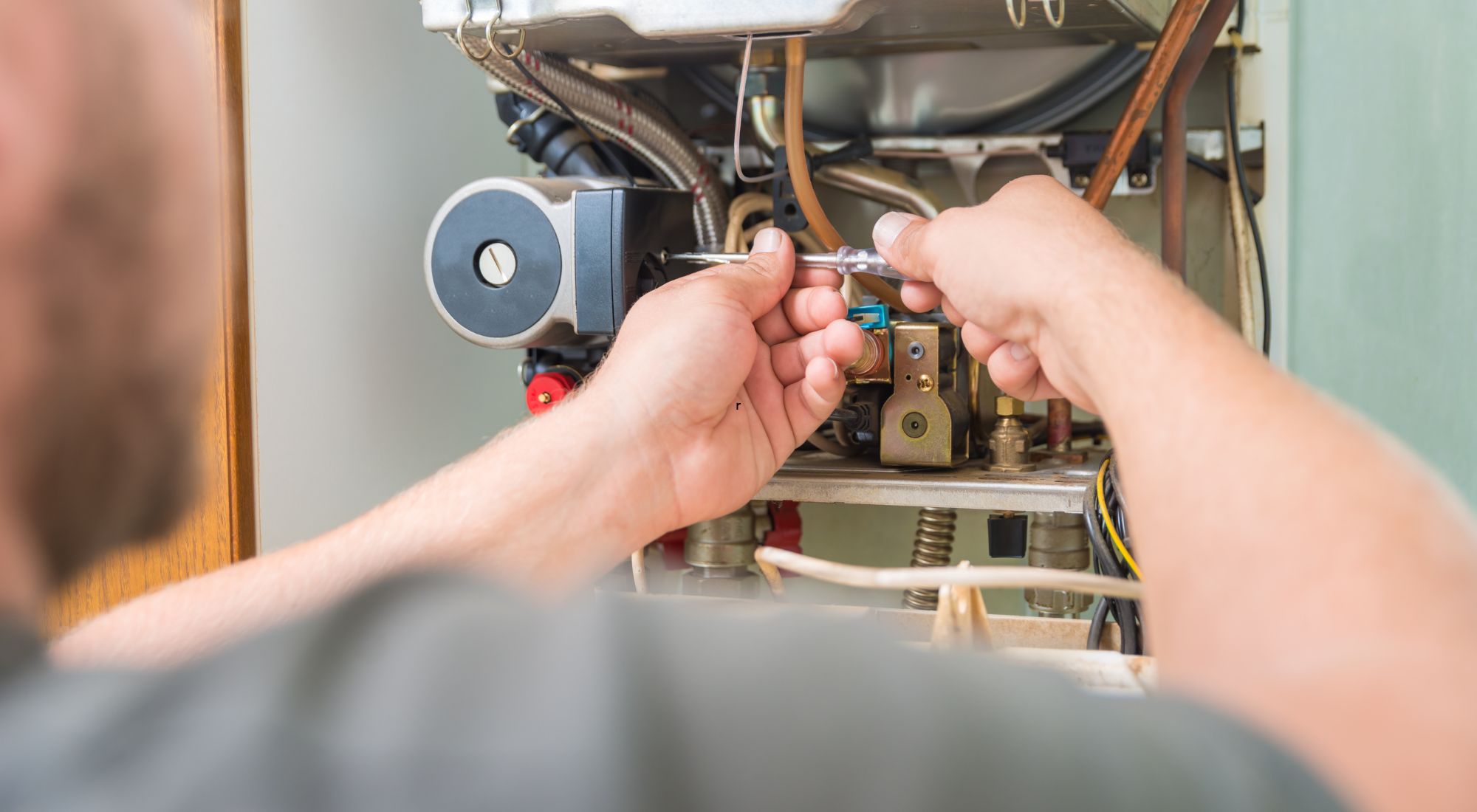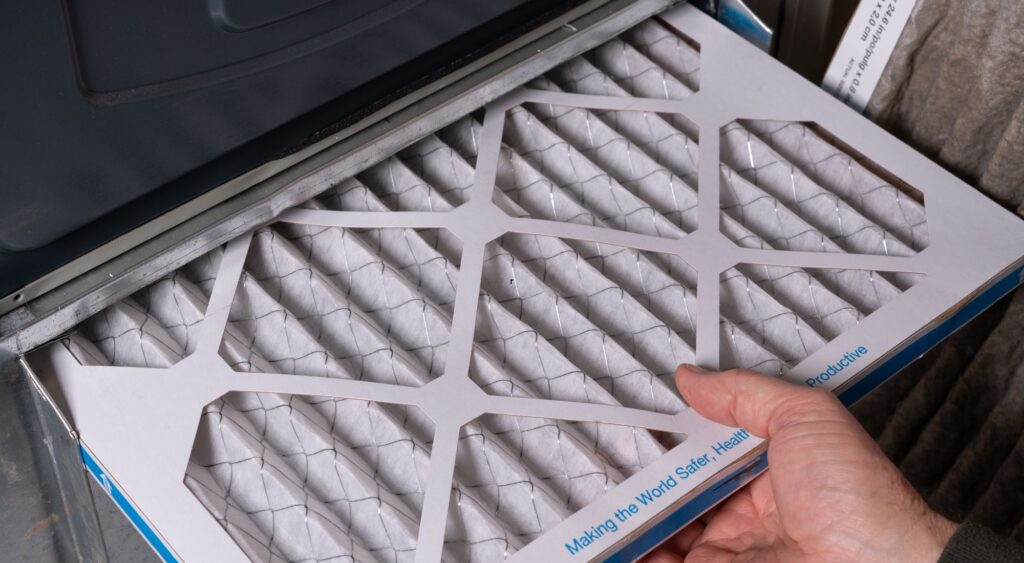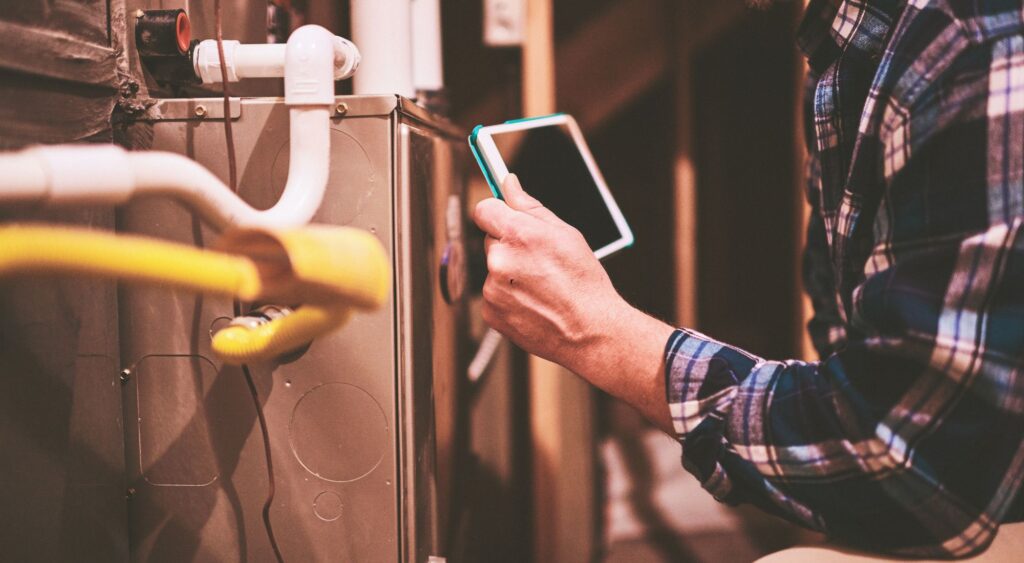
Your furnace is the heart(h) of your home, and when it is acting up, it can be annoying and scary.
Noise, lack of heating, and water around your furnace could be a sign of a bigger furnace issue. And when it comes to the comfort and safety of your home, no issue is too minor.
Don’t wait until your furnace problems grow into something costly or dangerous. Learn how to troubleshoot your furnace and when you may want to call in an HVAC professional.
Table of Contents
- How Do You Troubleshoot a Furnace Problem?
- 3 Most Common Furnace Problems FAQs
- Other Common Signs of Furnace Distress
- AAA Heating and Cooling Can Help You Quickly and Safely Resolve Your Furnace Problems
How Do You Troubleshoot a Furnace Problem?
Do you suspect that your furnace is acting up? Before calling a professional, you can troubleshoot minor furnace problems with these six steps:
- Check your thermostat: Ensure that your thermostat is on. If your home seems warm, but you feel cool air blowing from the registers, look at the thermostat’s settings. Verify that it’s set to “Auto” instead of “On.” When the furnace is on the “On” mode, it will continuously blow air, even if it’s not heating the air. Check the batteries to see if they still work. If not, check to see if your thermostat is on, try switching the fan to “On.” If it does not begin blowing, your furnace is not getting power or the motor may be broken.
- Change your air filter: If more than a month has passed since you last changed the furnace’s air filter, now is a good time to replace it. Dirt and debris trapped within the filter might be restricting airflow, causing the furnace to overheat and trigger the safety control, or limit switch, to turn off the burners. As a result, the blower continues to blow cool air to cool down the furnace. Ignoring the air filter and repeated overheating will damage the heat exchanger, leading to an expensive repair. Remove the old, dirty filter, and then wait 30 minutes before resetting your furnace. If your unit still refuses to start, hit the reset button and wait another 30. You will also want to make sure the furnace door is closed all the way, as this may sometimes prevent it from starting.
- Check that your furnace is on: Check that your furnace is getting power to it. A good place to look first is the breaker in your electrical panel. Make sure the breaker was not tripped because of any loose connections before flipping it back on.
- Look for blockages in your furnace vent: Check to see if any debris is blocking your furnace venting. Snow, ice, weeds, and grass may often constrict airflow and prevent your furnace from working properly.
- Check the blower fan: Not all furnaces have a blower fan, but if yours does, you’ll want to make sure it is on.
- Call a professional: Repairing your furnace yourself is risky. Any errors you make could void your HVAC warranty, or worse: risk the health and safety of your family and home. Call a professional if these troubleshooting tips do not solve your furnace problems.
AAA Heating and Cooling has proudly served Portland and the surrounding areas since 1961.
In our experience, there is no furnace problem too big or too small for us to handle. Whether you need an inspection, repairs, or replacement, we will work with you to quickly, affordably, and effectively solve your heating and cooling issues.
3 Most Common Furnace Problem FAQs
If you find yourself asking one of these three questions, you may have a furnace problem — and possibly one that you cannot afford to ignore.
#1: Why Is My Furnace Clicking?
It’s common for furnaces to make noises, such as the hum you hear as it operates.
Pay attention to unfamiliar sounds as they could be a sign that the heating system is in need of repair.
Loose Inducer
Oil-powered furnaces use a motor-powered fan, or inducer, to push out smoke and fumes. The fan might make a clicking noise if it becomes loose. Clicking can also happen if soot or grime builds up on the fan blades.
It’s best to let a professional deal with cleaning or calibrating the fan, especially if the furnace is still under warranty.
Worn Motor Bearings
Ball bearings also reduce the rotational friction in furnace motor fans. Since they absorb so much pressure, they wear down over time. When the bearings become worn, they cause the furnace fan to slowly become unstable and make a clicking sound. Leaving the issue unaddressed will cause the motor to burn out.
Gas Valve
If the clicking sound doesn’t seem to have a pattern, it could indicate an issue with the gas valve. The fix is a home meter replacement, a repair that must be completed by a professional from your gas company as required by law.
Pilot Light
With time, pilot light assemblies become loose, bent, worn, or dirty, preventing the pilot light from functioning properly. The clicking noise could be an issue with the system’s wiring, a broken flame sensor, ignition problems, gas issues, or a faulty pilot. If you see any of these issues, call a certified Portland furnace repair specialist quickly.
#2: Why Is My Furnace Blowing Cold Air?
An obvious sign that your furnace is having problems is that it is blowing cold air. This may be caused by one of the following reasons.
Pilot Light
A common reason your furnace is blowing cold air would be a blown-out pilot light. Like your furnace, your pilot light is fueled by natural gas, which comes from a small tube in your gas pipe. This tube is fitted with a safety feature that cuts off the gas when your pilot light goes out.
If the pilot light is out and refuses to light, gas might not be flowing into the furnace. Verify that the gas valve switch is at the “On” position. If it is on, the pilot light might be dirty. If this is the case, contact your HVAC specialist for advice on cleaning it.
If pilot light troubleshooting tips do not work and the flame doesn’t stay lit, the thermocouple may need to be adjusted or replaced. In that case, you may want to call a professional. Other reasons for your pilot light to go out include:
- Your gas has been shut off.
- Your furnace needs to be cleaned.
- Your home may not be getting enough natural gas.
Ductwork Leaks
When ductwork has holes, it will send warm air into unoccupied spaces of your home, such as the attic or crawlspace. Similarly, cold air from the unoccupied spaces might enter the ductwork and blow into your home. A duct inspection and repair will quickly remedy this problem.
Clogged Condensate Drain Lines
High-efficiency furnaces have condensate drain lines that remove water during the heating process. If the line becomes clogged, it can trigger a safety feature that keeps the burners from lighting.
#3: Why Is My Furnace Leaking Water?
Water is one thing you do not want to see hanging around your furnace. Luckily, if water is pooling underneath yours it may be caused by one of the reasons below and is, generally, an easy fix.
Condensation Leak
If your high-efficiency furnace leaks, the culprit is generally a condensation leak.
The unit extracts heat from combustion gasses using two heat exchangers, causing the gasses to cool and condense. A condensate drain directs the water out of your home. If it pools around your furnace, the condensate drain or tubing may be clogged or broken, or the condensate pump might need to be repaired.
Dehumidifier Leak
Leaks may also be the result of a whole-house dehumidifier leaking into the furnace or the installation of an incorrectly sized flue pipe.
Other Common Signs of Furnace Distress
Clicking sounds, cold air, and leaks may be the most common signs of furnace issues. However, there are plenty of other signs that your furnace may need to be repaired or replaced.
Unusually High Heating Bills
Due to its mild climate, Oregon has some of the lowest energy costs in the country.
The average gas bill in Oregon is $77 per household. However, these costs may slightly increase in the winter. If your heating bill is much higher than this or tends to sporadically rise and fall, you need your furnace inspected, repaired, or replaced.
Abnormal Smells
Everyone is familiar with odd smells when starting up your furnace for the season, but when these smells suddenly appear and linger, you may just have a furnace problem on your hands.
Weird smells that emanate from your furnace might include:
- Metallic smell: If your furnace is overheating, it may produce a “metallic burning smell.” Another cause for this smell may be a sign of poor combustion, which could lead to increased carbon dioxide levels in your home. While you cannot smell CO, you can smell Aldehydes (a by-product of bad combustion) which often have a pungent and metallic scent.
- Rotten eggs: Gas is generally described as having a “rotten egg” smell. If your vents are emitting a rotten egg smell, it is best that you turn your furnace off, notify your gas company, and call a heating and cooling professional.
- Burning dust: When you turn your heater on for the winter, you may sense a slightly burning smell. Typically, this is from the dust that has settled in your air vents during the off-season. If this smell does not dissipate within a few days of starting your furnace, you may need your ducts and vents professionally cleaned.
Discolored Pilot Light
Your pilot light should be a bright, blue, and unwavering flame. If your pilot light is yellow or orange and flickering, you may have an issue that could threaten the safety of your furnace and home. This could be caused by incorrect gas pressure or a misaligned/dirty burner.
Other Strange Noises
Clicking is not the only audible sound associated with furnace problems. When your furnace needs repair or replacement, it may fill your home with other odd noises.
Rattling, Rocking, or Vibrating Noises
At the very least, this could be caused by a loose cover panel. On the other hand, it could be a warning sign that the heat exchanger could be cracked which might send dangerous toxins into your home’s air. Either way, if your furnace is making a rattling, rocking, or vibrating noise you may want to play it safe and call a trusted heating and cooling expert.
High-Pitched Squealing
Your furnace’s blower belt may release a high-pitched squealing sound when it is slipping or frayed. This may also be a sign that your furnace’s ball bearings need to be lubricated.
Scraping Sounds
Scraping sounds could be another sign that your furnace’s ball bearings are worn out. To avoid costly damage, call a trusted furnace expert as soon as possible.
AAA Heating and Cooling Can Help You Quickly and Safely Resolve Your Furnace Problems
Furnace problems are more than an inconvenience, they’re a hazard. Don’t wait for your furnace issue to resolve on its own. Being proactive could save your money and your life.
Many of the common problems furnace owners experience can be prevented with a tune-up and inspection, which is why it’s important to schedule furnace maintenance with a specialist from AAA Heating & Cooling. Whether your furnace is acting up or needs a tune-up, our specialists are standing by and ready to help.
It is our mission to help homeowners stay warm and safe year-round. Whether your furnace is clicking, blowing cold air, leaking, etc., we can help you quickly and safely resolve your furnace problems.
AAA Heating and Cooling are the furnace specialists you can trust with your home’s heart(h). Call to schedule an appointment today.


